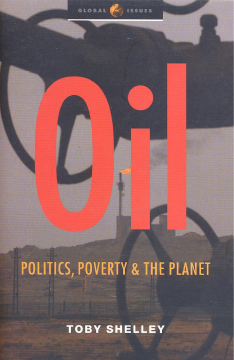
Additional Information
Book Details
Abstract
Access to oil and natural gas, and their prices, are hugely important axes of geo-political strategy and global economic prospects and have been for a century. This book, written by a Financial Times journalist who has long covered the energy sector, provides readers with the essential information they need for understanding the shifting structure of the global oil and gas economy: where the reserves lie, who produces what, trade patterns, consumption trends, prices.
The book highlights political and social issues in the global energy sector -- the domestic inequality, civil conflict and widespread poverty that dependence on oil exports inflicts on developing countries and the strategies of wealthy countries (especially the United States) to control oil-rich regions.
Energy demand is on a strong upward trend. The reality of the environmental damage caused by fossil fuels cannot be doubted. What are likely to be the human consequences: changing disease vectors, unprecedented flooding, mass migration? And what is to be done both in the wealthy countries where consumerism drives increasing growth in demand and in developing countries aiming to grow their economies faster? Are alternative energy sources a panacea? Or will the much vaunted hydrogen economy still be based on oil, natural gas and coal?
Here is a book that addresses what is perhaps the most pervasive and destabilizing of the issues facing humanity.
Toby Shelley has reported from many countries in the Middle East, North Africa and sub-Saharan Africa over the course of twenty years as a journalist. He works for the Financial Times. Previously he was regional energy news editor for Dow Jones Newswires. He contributes regularly to Middle East International. His most recent book is Endgame in the Western Sahara: What Future for Africa's Last Colony? (Zed Books, 2004).
Table of Contents
| Section Title | Page | Action | Price |
|---|---|---|---|
| Cover | cover | ||
| Contents | v | ||
| List of tables | vii | ||
| Introduction: Oil and natural gas: the issues\r | 1 | ||
| 1. Insatiable demand and the quest for supply | 5 | ||
| Feeding frenzy | 7 | ||
| Production now and for the future | 10 | ||
| Financing the consumption boom | 15 | ||
| 2. Conflict, poverty, inequality: the mixed blessing of oil | 27 | ||
| The revenue roller-coaster | 28 | ||
| Smoothing the ride | 30 | ||
| Bitter harvest from ‘sowing the oil’ | 33 | ||
| Dutch disease and wasted windfalls | 35 | ||
| Oil and poverty | 40 | ||
| The petro-economies and the scramble for spoils | 42 | ||
| Rent allocation and corruption: shades of grey | 50 | ||
| Oil and civil conflict | 55 | ||
| Local versus national government | 69 | ||
| Oil and labour | 71 | ||
| Cross-border tensions | 77 | ||
| 3. Oil security and global strategy | 82 | ||
| Cold War years | 85 | ||
| Producers to the fore | 88 | ||
| The IEA: meeting collective action with collective action | 95 | ||
| Garrisoning the Middle East | 100 | ||
| ‘War on terror’: new name, same policy | 103 | ||
| Securing the Caspian or opening Pandora’s box? | 105 | ||
| Targets galore | 110 | ||
| China: tomorrow’s bogeyman | 114 | ||
| Security through diversification: chasing a chimera | 117 | ||
| Controlling Iraq, replacing Saudi Arabia? | 122 | ||
| 4. Petronationalism | 127 | ||
| OPEC: the producers stake their claim | 129 | ||
| From bear pit to central bank | 135 | ||
| Return of the companies | 140 | ||
| An OPEC for natural gas producers? | 144 | ||
| Rise of the new consumers | 148 | ||
| 5. ‘Alternatives’ to oil: environmental and ‘security’ imperatives | 154 | ||
| Kyoto: up to the top of the hill (and down again) | 159 | ||
| The cost of cleaning up emissions | 161 | ||
| War gaming meets global warming | 164 | ||
| ‘Alternatives’: blurring security and sustainability | 165 | ||
| Evaluating the ‘alternatives’ | 168 | ||
| Hydrogen economy: another hydrocarbon economy? | 173 | ||
| Conclusion: Posing the questions | 178 | ||
| Notes | 198 | ||
| Index | 211 |
